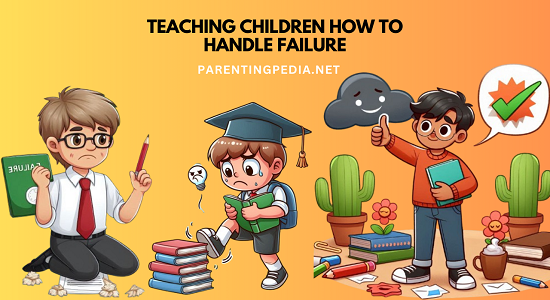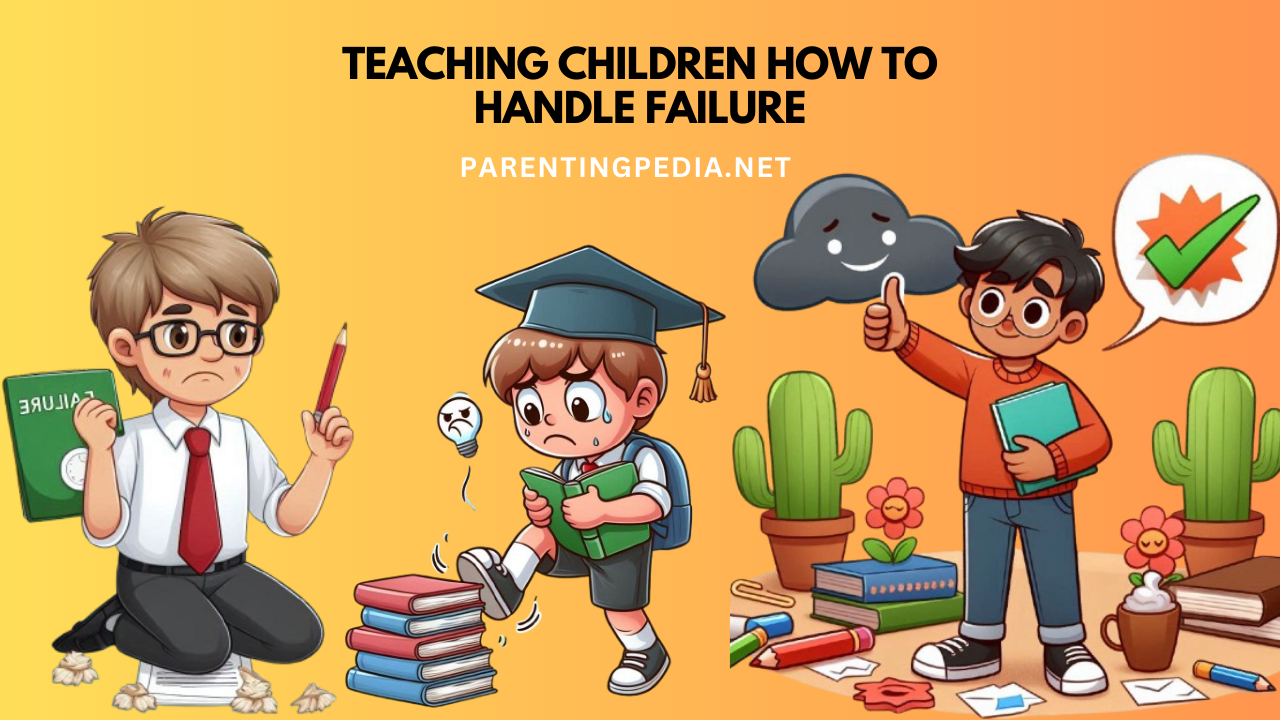Failure is an inevitable part of life, and teaching children how to face and grow from setbacks is essential for their emotional and mental development. Failure is a natural and essential part of life, yet many children struggle to cope with setbacks. Teaching children how to handle failure equips them with valuable skills like resilience, problem solving, and emotional regulation, enabling them to approach challenges confidently. Handling failure effectively helps children build resilience, promote a growth mindset, and develop problem solving skills that will benefit them throughout life. This article explores strategies for teaching children how to understand, accept, and learn from failure in a healthy and constructive way.
Understanding Failure From Child’s Perspective
For children, failure might seem overwhelming and final. Whether it is losing a game, performing poorly on a test, or struggling with a skill, these experiences can generate feelings of frustration, embarrassment, or sadness in children. Parents and caregivers play a critical role in helping children accept failure as an opportunity for growth rather than a reflection of their worth.
a. Why Failure Feels Big To Kids
- Lack of experience: Young children are still learning to process emotions and setbacks.
- Fear of disappointing others: Kids may worry about letting down parents or teachers.
- Fixed mindset: Children with fixed mindset may see failure as a sign of inadequacy.
b. Importance Of Addressing Failure
Ignoring or dismissing a child’s feelings about failure can lead to a fear of trying new things. Addressing it openly helps children build emotional resilience and encourages them to take healthy risks in future.
Shifting The Mindset By Emphasizing Growth Over Perfection
A growth mindset teaches children that abilities and intelligence can be developed through effort and perseverance. By encouraging this mindset in children, parents can help children view defeat as a stepping stone to success.
a. Reframe Failure
- Encourage children to see failure as a chance to learn something new.
- Ask children to replace “I failed” with “What can I learn from this?”
b. Celebrate Effort
- Praise the process rather than the outcome. Encourage them by using phrases like “I am proud of how hard you worked” instead of “You are so smart.”
- Highlight to children their improvement in performance over time to show progress matters more than instant success.
c. Share Examples
- Share stories of famous individuals to children who overcame failures in their life to inspire them.
- Parents and teachers must use personal experiences of their life to demonstrate how they have learned from setbacks.
Strategies For Teaching Children To Handle Failure
a. Encourage Open Discussions
Create a safe space for children to talk about their feelings and experiences with disappointments. Listen without judgment and validate their emotions by saying things like, “It is okay to feel upset, it shows you care.”
b. Teach Problem-Solving Skills
- Break down challenges into manageable steps.
- Ask questions from children like, “What could you do differently next time?” or “What did you learn from this?”
c. Focus On Resilience
- Encourage children to try again after failure, reinforcing the idea that persistence leads to growth.
- Use phrases in front of children like, “Every mistake is a step closer to success.”
Also Read: Understanding Mental Trauma In Children And Teens
d. Normalize Failure
- Share examples of everyday disappointments and how they are resolved.
- Normalize mistakes in front of children and show that everyone, including adults, makes mistakes.
e. Practice Gratitude And Optimism
- Teach children to look for the positives in their experiences, even when things don’t go as planned.
- Reflect on what went well, alongside what can be improved.
Teaching Failure Through Everyday Activities
a. Games And Sports
- Use competitive activities to teach good sportsmanship and resilience to children.
- Emphasize the fun of playing over winning, and discuss with children how losing offers a chance to improve.
b. Schoolwork
- Encourage children to ask for help when needed and view mistakes as part of learning.
- Appreciate the effort children put into their studies, even if the outcome is not perfect or as per your expectations.
c. Creative Projects
- Activities like painting, building, or writing can teach children that trial and error are natural parts of the creative process.
- Encourage them to experiment and see “mistakes” as discoveries which will help in their growth process.

Modeling Healthy Responses To Failure
Children learn a lot by observing how adults handle failure. Parents and caregivers can demonstrate constructive ways to face setbacks by behaving in healthy way in front of children:
a. Show Vulnerability
- Share your own experiences with setbacks, including how you felt and what you learned.
- Say things like, “I tried something new today, and it didn’t work out, but now I know what to do differently” to encourage children.
b. Practice Self-Compassion
- Model self-kindness by avoiding harsh self-criticism in front of your child.
- Use affirming language in front of children like, “I am proud of myself for trying, even if it did not work.”
c. Stay Calm
- React to your child’s failures with understanding rather than frustration.
- Avoid shaming or overreacting, which can intensify fear of failure in children.
Building A Supportive Environment
a. Encourage Curiosity
- Create a home environment where asking questions and exploring ideas is valued.
- Show interest in your child’s efforts, even when they struggle.
b. Promote Independence In Children
- Allow children to take risks and solve problems on their own, stepping in only when necessary.
- Let them experience small failures, such as forgetting to bring their homework, as learning opportunities.
c. Be Patient
Understand that building resilience takes time. Celebrate small wins and incremental progress along with children.
Common Challenges And How To Address Them
a. Fear Of Failure
If your child is overly afraid of failing, reassure them that mistakes are part of learning. Encourage small risks to build confidence in children.
b. Perfectionism
For perfectionist children, emphasize the value of effort and growth over achieving flawless results. Remind them that everyone makes mistakes.
c. Comparing Themselves To Others
Help children focus on their own progress rather than comparing themselves to peers. Highlight their unique strengths and abilities.
Encouraging A Lifelong Positive Relationship With Failure
Handling failure is a skill that evolves over time. By teaching children to embrace setbacks as a natural part of growth, you empower them to succeed in future. Encourage open conversations, promote resilience, and celebrate your child’s efforts to help them see challenges as opportunities.
Conclusion
Failure is not the end but a stepping stone to growth. By teaching children how to handle setbacks with resilience and optimism, parents and caregivers equip children with invaluable life skills. Whether through learning from defeat, promoting a growth mindset, or modeling healthy responses, these practices empower children to face challenges with courage and confidence. Emphasizing effort over perfection, creating a supportive environment, and celebrating learning from mistakes will help children see setbacks as an essential and positive part of their journey.
FAQ
How do you motivate a child who failed?
Motivate a child who failed by offering empathy and reassurance. Remind them that failure is a stepping stone to success. Celebrate their effort, help them identify lessons learned, and set achievable goals for improvement. Encourage persistence, highlight their strengths, and express confidence in their ability to overcome challenges and grow.
How to teach kids to handle failure?
Teach kids to handle failure by taking it as a learning opportunity. Encourage them to reflect on what went wrong, appreciate their efforts, and identify ways to improve. Model resilience by sharing your own experiences with setbacks. Emphasize perseverance, build their confidence, and promote a supportive environment for growth and self-discovery.
Remember, the greatest reward of parenting lies in watching
your children soar with love and confidence.
Till then keep smiling and be happy

